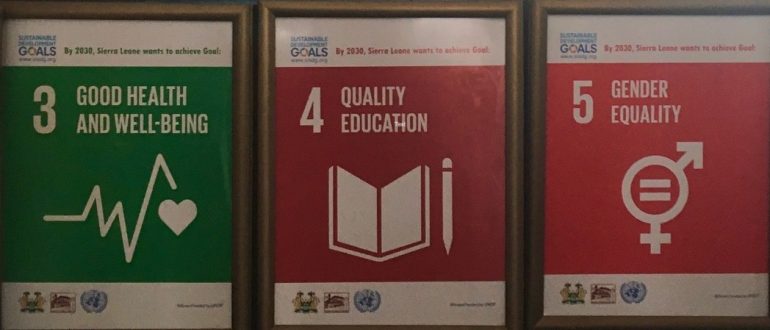
Gender (In)Equality and Health Crisis Management in Developing Countries – Lessons from Sierra Leone
Gender Inequality and Health Crises
In the wake of the COVID-19 pandemic sparking a significant health and economic crisis not only among developed but also developing countries, creating effective policies and interventions to protect citizens from the negative impacts needs to be on the agenda of policy makers. This is especially true for women and girls, as they are not only more affected by poverty than same-aged boys, but they also become victims of the adverse effects of crisis more easily (Rauf, 2016, p. 9). As previous health crises have shown, the negative impact on the economic, social and health lives of girls can be detrimental. This article will explore how the Ebola crisis in Sierra Leone impacted women and girls and which policies worked to protect them, which possibly helps to mitigate the negative consequences of the current COVID-19 pandemic.
Ebola in Sierra Leone
Just a few years ago, from 2014 to 2016, Sierra Leone, a small country in West Africa with over seven million citizens, was severely affected by the spread of the Ebola virus disease (EVD). The 2014-16 outbreak in Guinea, Liberia and Sierra Leone was an unprecedented severe epidemic of Ebola, with over 11,000 deaths (Roemer-Mahler and Rushton, 2016, p. 373). Half of all cases were hosted by Sierra Leone, making it the country most affected due to rapid contagion, which was caused by high rates of geographic mobility and the use of traditional burial practices (Bandiera et al., 2019, pp. 1–8). To contain the fast spreading of the disease, the Sierra Leonean government closed all primary and secondary schools in the 2014-15 academic year. Some villages were locked down and travel was banned, which in turn severely curtailed economic activity. Several health facilities were transformed into Ebola holding centers and health workers were mobilized to track contagion. However, not until November 2016 Sierra Leone was declared Ebola free (Bandiera et al., 2019, pp. 8–14).
COVID-19 in Sierra Leone
Now, COVID-19 created a new crisis, with its potential impacts extending beyond public health. Luckily, as parts of the Ebola response efforts were inherited into the current response, it seems reasonably well-organized this time. Sierra Leone closed all its land borders on March 25th, and quickly followed to close education institutions, village markets and restaurants (Grieco and Yusuf, 2020, pp. 7–10). However, the consequences of these measures are difficult to predict. The Sierra Leone Telegraph wrote that “[…] health crises such as the Ebola and now the COVID-19 crisis undermine strategies to end sexual and gender-based violence (GBV) and other harmful practices and pose a serious threat […]” (Coulson et al., 2020). To better design policies and interventions this time, it is helpful to examine the impact of the EVD crisis on young women in Sierra Leone.
The negative effects of the EVD epidemic on women
As several studies show, the negative effect of the EVD epidemic on young women is not only limited to their health and reproductive lives, but their economic and social lives were disturbed as well. They were more affected by the economic downturn (which amounted to a contraction of GDP growth of 20 percent) caused by travel bans, increased transport costs and government restrictions. Non-agricultural self-employment (such as petty traders and food processing), consists to a large degree of women and was hit particularly hard (Fu et al., 2015, p. 13). Additionally, the gap in the health care system caused by an inadequate number of specialist health workers and an inequitable distribution of personnel is filled by women’s unpaid labor (Roemer-Mahler and Rushton, 2016, p. 378). Hence, women have taken on much of the burden in the Ebola outbreak, being directly at risk for contraction and indirectly affected by a worsening of the access to maternal and reproductive health care and carrying out traditional burial practices (Anderson and Beresford, 2016). Furthermore, with the reopening of school, the Ministry of Education of Sierra Leone introduced a new policy, deciding that ‘visibly pregnant’ girls were unable to re-enroll due to the believe that they impact other girls negatively. The enforcement of this ban was left to school principles. Thus, girls spent significantly more time with men, which led to an increase in unwanted and unprotected sex as well as teen pregnancies, and school enrollment post-crisis dropped significantly (Bandiera et al., 2019). The severity of the consequences on young women and girls is apparent.
Interventions to mitigate negative effects during Ebola
Consequently, the question of the prevention of similar effects caused by comparable measures introduced during the COVID-19 pandemic arises.
One intervention which proved to a certain extent successful is the creation of safe spaces for girls, where they can spend time away from men. Pre-Ebola, the NGO BRAC established such safe spaces in the form of clubs in many villages. The effects were studied thoroughly: the fall in school enrollment rates was completely offset by the program, it improved basic numeracy and literacy skills, reduced time spent with men or alone and prevented out-of-wedlock pregnancies (Bandiera et al., 2019) .
Examining the program in more detail, one can find that the wholesome design makes it attractive for women to go to the clubs: they offer life skills, vocational skills and microfinance programs, a fixed location in a village where club members can gather and socialize and the modules cover subjects such as reproductive health, STDs, family planning and legal knowledge on bride price. Furthermore, the vocational skills program includes tailoring, soap making, hairdressing and tie dying. The program, which is called Empowerment and Livelihoods Action Program (ELA) established 150 clubs and reached 3,592 girls across Sierra Leone. Throughout the epidemic, most of the clubs managed to continue operating, sometimes with limited capacity (Bandiera et al., 2019, pp. 10–12).
In a study by Bandiera et al. (2019), over 4,700 girls were surveyed pre- and post-crisis. The researchers classified villages which either experienced low disruption or were highly disrupted by Ebola due to a low functioning of the nearest primary health unit (PHU) facility and the nearest secondary school. Furthermore, villages were categorized into control and treatment villages, depending on the presence of an ELA club (Bandiera et al., 2019, p. 19).
In villages without the program and high Ebola disruption, teen pregnancies rose by almost 11 percent. However, these effects are almost entirely reversed in villages with the ELA program and high Ebola disruption, which enables the girls to spend more time away from men. Hence, out-of-wedlock pregnancies are prevented, and girls re-enroll in school post-crisis.
However, as this intervention might seem hopeful for implementation during COVID-19, negative results need to be addressed as well. While young girls significantly benefitted from the program, older girls aged 18 to 25 reported an increase in unwanted or transactional sex. This occurs because younger girls are less available to men due to the ELA clubs and thus men turn to older girls for sexual relations (Bandiera et al., 2019, p. 32). These negative externalities for older girls need to be addressed when designing further interventions. Additionally, the implementation of ELA clubs in other countries showed that insufficient funding induced incomplete programs, which can be detrimental.
The mechanism of providing a safe space in combination with educating girls on reproductive health yielded a positive impact. However, safe spaces need to be constructed such that older girls benefit from them as well. As the COVID-19 pandemic also hit Sierra Leone, these kinds of interventions might not only make a meaningful difference for women in Sierra Leone, but perhaps also in other developing countries.
Policy recommendations
The COVID-19 crisis shows significant differences to the EVD epidemic. Political fears about the negative economic consequences of restrictions on economic activity may lead the government not to implement highly restrictive social distancing policies (Grieco and Yusuf, 2020). However, the global economic downturn will affect the economic lives of women and girls in Sierra Leone, too. Thus, job losses and school closures can lead to an increase in sexual and gender-based violence. Interventions such as the ELA program can help mitigate negative effects. As the implementation of the program in other countries has shown, sufficient funding is key. Therefore, policy makers in development aid in donor countries should support programs of this kind with sufficient funds to protect women and girls from the negative impacts of the current health crisis.
References
Anderson, E.-L. and Beresford, A. (2016) ‘Infectious injustice: the political foundations of the Ebola crisis in Sierra Leone’, Third World Quarterly, 37(3), pp. 468–486.
Bandiera, O., Buehren, N., Goldstein, M., Rasul, I. and Smurra, A. (2019) ‘The Economic Lives of Young Women in the Time of Ebola: Lessons from an Empowerment Program’, World Bank Policy Research Working Paper Series, no. 8760 [Online]. Available at https://openknowledge.worldbank.org/bitstream/handle/10986/31219/134123-WP-PUBLIC-The-Economic-Lives-of-Young-Women-in-the-Time-of-Ebola.pdf?sequence=1&isAllowed=y (Accessed 27 June 2019).
Coulson, J., Clarke, R. and Fall, M. M. (2020) ‘COVID-19 jeopardises progress in protecting women and girls from violence and harmful practices’, The Sierra Leone Telegraph, 16 June [Online]. Available at https://www.thesierraleonetelegraph.com/covid-19-jeopardises-progress-in-protecting-women-and-girls-from-violence-and-harmful-practices/ (Accessed 9 July 2020).
Fu, N., Glennerster, R., Himelein, K. and Rosas, N. (2015) ‘The Socio-Economic Impacts of Ebola in Sierra Leone: Results from a High Frequency Cell Phone Survey, Round 1’ [Online]. Available at http://www.worldbank.org/content/dam/Worldbank/document/Poverty%20documents/Socio-Economic%20Impacts%20of%20Ebola%20in%20Sierra%20Leone,%20Jan%2012%20(final).pdf (Accessed 13 June 2019).
Grieco, K. and Yusuf, Y. (2020) COVID-19 Series: Working Paper – Sierra Leone [Online], Maintains. Available at https://maintainsprogramme.org/rc/covid-19-series-working-paper-study-sierra-leone/ (Accessed 9 July 2020).
Rauf, W. (2016) ‘Empowering women and girls affected by crisis’, Care Insights [Online]. Available at https://www.care-international.org/files/files/Empowering_women_and_girls_affected_by_crises.pdf (Accessed 12 June 2019).
Roemer-Mahler, A. and Rushton, S. (2016) ‘Introduction: Ebola and International Relations’, Third World Quarterly, vol. 37, no. 3, pp. 373–379.

Laura Glatter
Laura Glatter holds a B.Sc. in Political Science from the Technical University of Munich. Currently, she is finishing her B.Sc. Economics degree at the University of Munich. Passionate about development policy and economics, she interned at the Germany Embassy in Ghana and the Ministry for Economic Cooperation and Development in Berlin.
